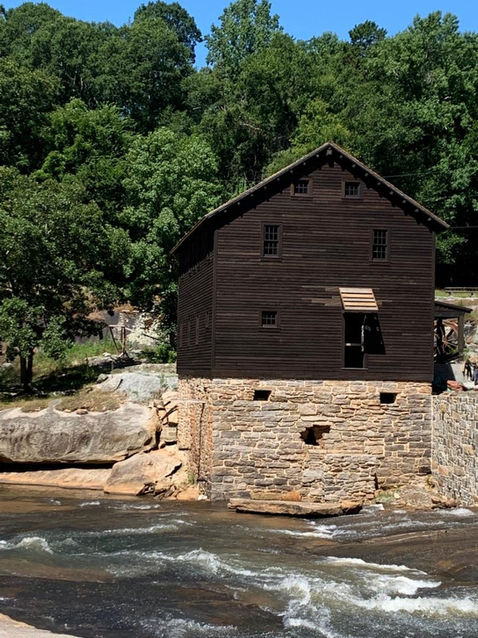Closed for Restoration
Opening Date TBD
Historic
Anderson Mill
5255 Anderson Mill Road
Moore, SC 29369
Anderson Mill is the oldest standing mill in South Carolina and the birthplace of Spartanburg County government. The Tyger River Foundation is restoring this property to an operating mill open periodically to the public and is establishing an endowment to keep the mill in operating order.

History
at Historic Anderson Mill
Located at the intersection of the North Tyger River and Anderson Mill Road in Spartanburg County, about 8 miles southwest of the town square in Spartanburg, Anderson Mill was formerly known as Nicholl’s Fort, Nicholl’s Mill and Tanner’s Mill. The mill gets its current name from James “Tyger Jim" Anderson who acquired the mill in 1831. The site of the establishment of Spartanburg County in a court held in the Spartanburg District on the third Monday in June 1785. The mill is important to Spartanburg's local history.
Anderson Mill is located adjacent to a set of rapids with significant drop and is supplied by a millpond created by a diversion wall with a stone and wooden flume leading to the waterwheel.
The original facility is believed to have been built about the time of the American Revolution. There was a major rebuilding process after the mill was heavily damaged by floods in the early 1900's. The Mill is the oldest mill in South Carolina still standing on its original foundation. It was last operated commercially in 1975 by A. A. Sellars. Anderson Mill (Anderson’s Mill) was listed in the National Register of Historic Places in 1978.
The Tyger River Foundation began exploring the possibility of restoring the mill in 2005 and has maintained the site since then. The adjacent Riveredge Homeowners Association donated the Mill to The Tyger River Foundation in 2010.
Photography
at Historic Anderson Mill
Historic Anderson Mill is one of the most picturesque settings in South Carolina. The Tyger River Foundation has worked to preserve its natural beauty and restore the property to its original state. This historic landmark is undergoing restoration due to the work of The Tyger River Foundation, a non-profit organization. In an effort to generate revenue for the ongoing maintenance of this site, The Tyger River Foundation charges a fee for photography or videography sessions on the site.
Please review the Photo/Video Agreement and keep it on hand. Then contact us about your session. Be sure to select the "Schedule Photography..." box and include details about your shoot in the Contact form under the "Questions or comments" section.
Other Mill Resources
We study old mills to support our efforts and increase our background knowledge. Join us in exploring historic mills!
Society for the Preservation of Old Mills (SPOOM)
The Society for the Preservation of Old Mills is dedicated to old mills and a technical resource for mill restoration, machinery, techniques, and history.
Fitz Waterwheel
https://www.waterwheelfactory.com/fitz.html
Learn more about the history of the Fitz Waterwheel. The main wheel at Anderson Mill is a Fitz wheel.
Suber's Corn Mill
https://www.facebook.com/SubersCornMill/
A commercial and industrial mill in Greer, SC, this grist mill began operations in 1908 and is still in continuous use. Fourth-generation millers grind corn for meal, grits and animal feed using water power.
Hagood Mill
https://www.hagoodmillhistoricsite.com/
A restored and operating mill above Pickens, SC
Francis Mill
A restoration effort in North Carolina
Murray's Mill
https://www.catawbahistory.org/our-sites/murrays-mill-historic-district
Murray's Mill near Hickory in Catawba County, NC
Old Mill of Guilford
http://www.oldmillofguilford.com
A restored mill in Guilford County, NC
Falls Mill
Belvidere, TN
Local History Resources
Kennedy Room of Local History, Spartanburg County Public Libraries
http://www.spartanburglibraries.org/Using-the-Library/Kennedy-Room
The Kennedy Room of Local and South Carolina History and Cleveland Genealogy Department houses an extensive collection of source material for genealogy and history researchers. In addition to books, types of materials in the collection include microform, maps, media clippings, manuscripts, visual arts and access to several online genealogy databases. The materials’ focus is on Spartanburg County, but also includes South Carolina and regional information.
Spartanburg County Historical Association
https://www.spartanburghistory.org/
SCHA preserves and promotes the rich history of Spartanburg County through education, community involvement, and sustainability. It manages the Spartanburg Regional History Museum, Walnut Grove Plantation, Historic Price House, and Seay House.
















